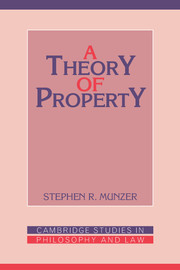Book contents
- Frontmatter
- Contents
- Preface and acknowledgments
- 1 Property, justification, and evaluation
- Part I Property rights and personal rights
- 2 Understanding property
- 3 Persons and their bodies
- Part II From individuals to social context
- Part III Justification and distributive equity
- Part IV Applications
- Table of cases
- Index of names
- Index of subjects
3 - Persons and their bodies
Published online by Cambridge University Press: 05 June 2012
- Frontmatter
- Contents
- Preface and acknowledgments
- 1 Property, justification, and evaluation
- Part I Property rights and personal rights
- 2 Understanding property
- 3 Persons and their bodies
- Part II From individuals to social context
- Part III Justification and distributive equity
- Part IV Applications
- Table of cases
- Index of names
- Index of subjects
Summary
BODY RIGHTS
This chapter addresses two main issues. One is the status of the body and of body rights. It is easy to suppose that, if one had a theory of property that adequately covered rights in land, chattels, and intangibles, then one would have a complete theory of property. Yet this supposition is too hasty, for it fails to consider whether there are property rights in the human body. The other issue is the relation between body rights and rights to other things in the world. If body rights turned out to be property rights, they might then be a springboard for justifying property rights as usually understood.
Here is how to resolve these issues. As to the former, some hold that the body should be thought of as property, and emphasize that each person owns or has title to himself or herself. Others maintain that the body ought not to be thought of as property at all, and indeed that it demeans human beings to think of them or their bodies as property. In contrast, the position advocated here suggests that, insofar as one takes an overall view, people do not own, but have some limited property rights in, their bodies (§ 3.2). One should, however, combine this broad view with a finer-grained classification, and recognize a division of body rights into personal rights and property rights and, in the case of the latter, a further division into weak and strong property rights (§ 3.3).
- Type
- Chapter
- Information
- A Theory of Property , pp. 37 - 58Publisher: Cambridge University PressPrint publication year: 1990
- 1
- Cited by



